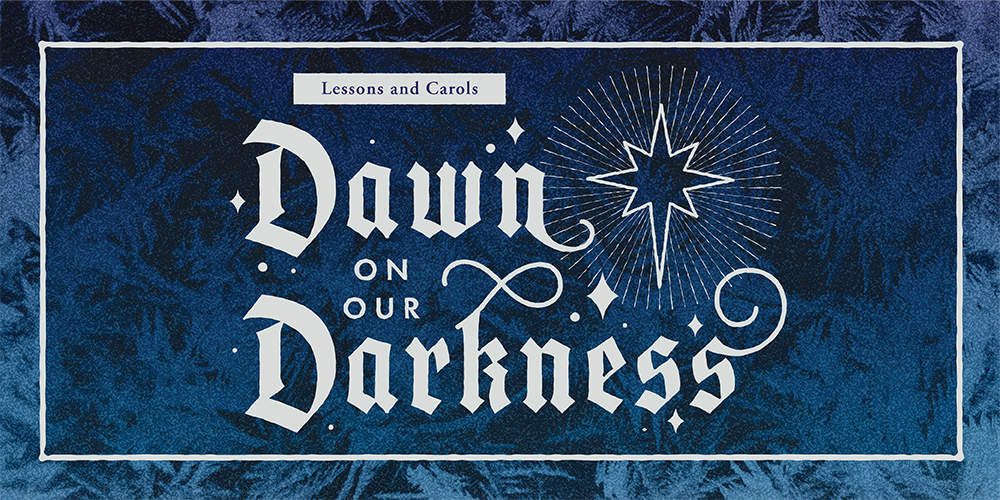
As a Director of Music, Christmas 2021 was my worst nightmare! Last year, we had to cancel Lessons and Carols services because of a breakout of COVID among the musicians at Tenth. As preparations are now well underway for our Christmas services this year, I am reminded of another church musician who also had some Yuletide challenges. In 1818, Franz Gruber, organist and choirmaster at St. Nicholas Church in Oberndorf, Austria just north of Salzburg, found himself having to prepare for this high point of the Christian musical year without the use of the organ, which had fallen into disrepair. To put this into perspective, imagine having to prepare Christmas dinner without an oven! We can probably all identify which his anxiety. Would their Christmas Eve services be as dark and gloomy as a late December day? Would their celebration of Jesus’ birth somehow be “spoiled” by circumstances beyond their control?
Darkness is a significant and powerful metaphor in Scripture often used to describe evil and its effects. Darkness is everything which is anti-God, everything which opposes God. The Apostle John writes, “God is light, and in Him there is no darkness at all (1 John 1:5).” Physical blindness in the Bible frequently symbolizes spiritual blindness. Sin has a blinding effect, making it impossible to see God or walk in His ways. Hence, sinful people are those who “love” or “walk” in darkness. “Fools” walk in the dark rather than in the light. Those who fall under the judgement of God are said to be cast into darkness, even as Egypt was wrapped in a plague of darkness, or the people of Israel themselves as they were carried off into the darkness of exile (see the book of Isaiah).
The four weeks leading up to Christmas are traditionally referred to as “Advent” in the church calendar. Advent refers to the “coming” or “appearing” of Jesus Christ. The “Christian year” was developed by the Catholic Church centuries before the Reformation to highlight the major points of Christ’s redemption as given in Scripture and subsequently taught in the Apostles’ and Nicene Creeds. The Apostles’ Creed says that our Lord Jesus Christ was “born of the Virgin Mary” (Christmas), “suffered under Pontius Pilate; was crucified dead and buried” (Good Friday), “the third day He rose again from the dead” (Easter), “He ascended into heaven…” (Ascension), “…I believe in the Holy Ghost…” (Pentecost). Advent and Lent were both “penitential” seasons leading up to Christmas and Easter respectively. The Protestant Reformers rightly corrected the concept of Penance as a sacrament of the Church, so Advent is not observed in that way in Presbyterian and Reformed Churches, hence Tenth’s fondness for singing Christmas carols during all of December!
Nevertheless, the truth is Christ came into the world to save us from our darkness. Jesus said, “I have come into the world as light, so that whoever believes in me may not remain in darkness (John 12:46).” We cannot experience the wonder of who Christ is as the light of the world unless we have some concept of the depths of darkness into which sin has taken us. This is the reason why we confess our sins every time we come together as God’s people for worship. We not only need Jesus at Christmas, we need Him every week, every hour. Again, Christ said, “I am the light of the world. Whoever follows me will not walk in darkness, but will have the light of life (John 8:12).”
What could “spoil” Christmas for you this year? Does the prospect of missing out on your favorite holiday celebration or traditional family gathering worry you? Perhaps having to attend the family gathering bothers you! Are you alone for the first time this December? Will you miss a loved one this year? Are you in a life transition? Are you struggling with a particular sin in your own life or suffering deeply on account of another’s sin? Praise God, the good news of the gospel is, “The light shines in the darkness, and the darkness has not overcome it (John 1:5).”
How did Franz Gruber’s Christmas without the organ go? He wrote a melody for a new carol his minister Joseph Mohr had recently written, Stille Nacht, Heilige Nacht. They sang it for the first time together at their Christmas Eve service, accompanied by a guitar. A literal translation of the original German verse 3 would read:
Silent night, holy night,
Son of God, oh how laughs
Love out of your divine mouth,
For now the hour of salvation strikes for us.
Christ, in Thy birth! Christ, in Thy birth!
We now sing verse 3 this way:
Silent Night! Holy Night!
Son of God, love’s pure light
Radiant beams from Thy holy face,
With the dawn of redeeming grace,
Jesus, Lord, at Thy birth; Jesus, Lord at Thy birth.
